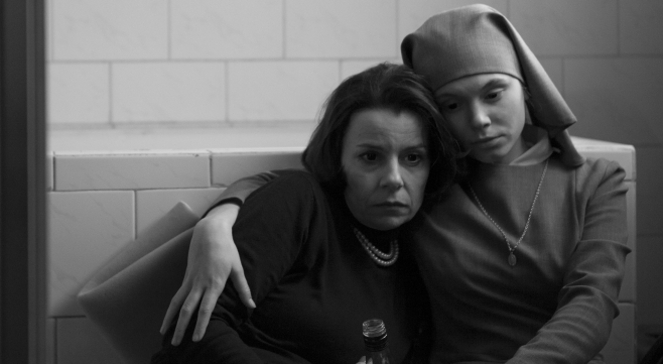
The former Soviet bloc is doing quite well in this year’s Oscar nominations—three out of the five nominees for Best Foreign Language Film come from either former Soviet republics or puppet states. Two of these nominees are frontrunners: Russia’s Leviathan (which we previously reviewed), and Poland’s Ida. Apparently, Ida has a slight edge, though if I was the only judge, things might be different. [Update as of February 22, 2015 — looks like Ida indeed won.]
Ida is decidedly different from Leviathan; the latter is comparatively ambitious in scope, whilst the former is more reserved. Set in 1960s Communist Poland, the film chronicles two women’s journey of personal discovery. Anna, a young novice nun, must visit her family before taking her vows. As an orphan, her only family is an alcoholic aunt named Wanda, who unemotionally reveals that Anna’s name is actually Ida Lebenstein and that her Jewish parents died during World War II. The two set off on a roadtrip across Poland to discover the circumstances behind the Lebenstein’s demise, and end up exploring both the past and their own selves.
If this sounds simple, that’s because the word “simple” is Ida‘s scripture. The plot progresses fluidly, and the characters are easy to track and identify with. Dialog is never intensive—images (the entire movie is also in black and white), not words, move this film along. Nonchalance defines many aspects of Ida: from Wanda’s tone of voice to the unvarnished physical landscapes. The overall feeling is reminiscent of a more art house-esque piece like Vive L’Amour, more contemplative and intellectual than in-your-face and entertaining.
Beauty pervades Ida, and actress Agata Trzebuchowska deserves immense praise for her innocent yet subtly haunting portrayal of the title character. It’s also not often that a film comes with such solid female leads and passes the Bechdel test with flying colors. However, in spite of its multitude of strengths, I wouldn’t designate Ida as the “best” foreign film of the year. It’s pretty high up there, but I wouldn’t give it the top place over something like Leviathan.
For one, maybe I’m just personally tired of self-reflective Holocaust discovery narratives. Even though the two aren’t that similar, Ida somehow reminded me of Jonathan Safran Foer’s novel Everything is Illuminated, which is about an American Jew’s artistically philosophical voyage to uncover his family’s World War II past in western Ukraine. I read Everything is Illuminated several years ago and loved it, but I’m not sure if I’d rave about it so much if I started reading it now. As I’ve consumed more and more media over the years, I’ve started to feel that the Holocaust is overplayed on the American landscape—which is unfortunate, because that trivializes the atrocity’s gravity. Ida is not a byproduct of American media so I can’t blame it for perpetuating this phenomenon, but at the same time it doesn’t stand out when viewed through my clouded American lens.
Artistry gives Ida elegance, but it also restricts its appeal and cultural significance. I have a bias towards social and political commentary, and I think that while the Oscars certainly exist in part to honor artistic achievement, they should also keep social impact in mind. Ida could’ve been made ten years ago and had the same impact as has being made in 2013: the messages are universal, but maybe not as immediately relevant as those in Leviathan.
All things considered, Ida is still very much worth watching if you are into still, quiet, artistic films. From what I’ve previewed of this year’s Oscar nominees, it wins hands down in the category of grace. Unfortunately, grace isn’t the only criterion for a winner, and for me Ida remains as a nominee.
Ida (Polish: Ida)—Poland. Directed by Paweł Pawlikowski. First released September 2013. Running time 1hr 22min. Starring Agata Trzebuchowska and Agata Kulesza.